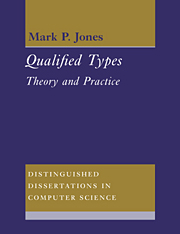Book contents
8 - Type classes in Gofer
Published online by Cambridge University Press: 05 May 2010
Summary
This chapter, describes GTC, an alternative approach to the use of type classes that avoids the problems associated with context reduction, while retaining much of the flexibility of HTC. In addition, GTC benefits from a remarkably clean and efficient implementation that does not require sophisticated compile-time analysis or transformation. As in the previous chapter we concentrate more on implementation details than on formal properties of GTC.
An early description of GTC was distributed to the Haskell mailing list in February 1991 and subsequently used as a basis for Gofer, a small experimental system based on Haskell and described in (Jones, 1991c). The two languages are indeed very close, and many programs that are written with one system in mind can be used with the other with little or no changes. On the other hand, the underlying type systems are slightly different: Using explicit type signature declarations it is possible to construct examples that are well typed in one but not in the other.
Section 8.1 describes the basic principles of GTC and its relationship to HTC. The only significant differences between the two systems are in the methods used to simplify the context part of an inferred type. While HTC relies on the use of context reduction, GTC adopts a weaker form of simplification that does not make use of the information provided in instance declarations.
Section 8.2 describes the implementation of dictionaries used in the current version of Gofer. As an alternative to the treatment of dictionaries as tuples of values in the previous chapter, we give a representation which guarantees that the translation of each member function definition requires at most one dictionary parameter.
- Type
- Chapter
- Information
- Qualified TypesTheory and Practice, pp. 101 - 113Publisher: Cambridge University PressPrint publication year: 1994



